Have you ever had a customer asking for a female crew? Most movers have had the request at some stage. The usual answer is no. But now, a new company in London is offering that service, not only to its own customers but to members of the trade. Steve Jordan went along to the famous White Hart Lane in Tottenham, to find out more.
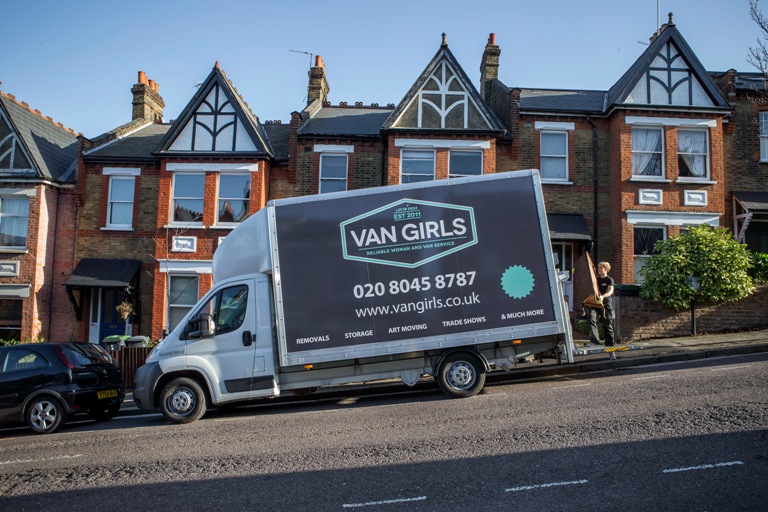
Van Girls started business two years ago. The company is run by Emma Lanman, an ex-firefighter, and Justine Walsh who previously worked as an outdoor adventure instructor. The idea came to Emma while still working in the fire brigade. She wanted to do some additional part time work and thought a ‘man and van’ type job would be a good idea. She talked about it with friends at length before one of them actually came up with a job to do. “So I bought a van and the company was started,” said Emma.
She had done som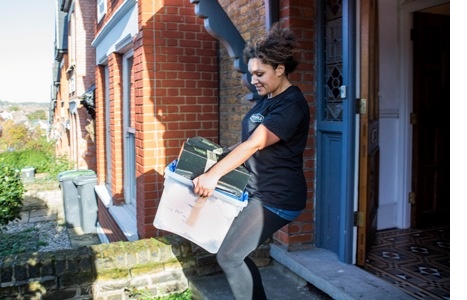 e research and found that there was little in the industry that was female led. As a firefighter and rugby player, most of Emma’s friends were physically capable and enjoyed hard work. “I thought we could fill a gap in the market,” she said.
e research and found that there was little in the industry that was female led. As a firefighter and rugby player, most of Emma’s friends were physically capable and enjoyed hard work. “I thought we could fill a gap in the market,” she said.
The moving industry has always been male dominated, as have most transport-related occupations worldwide, and Emma does understand the reasons for that. She said that she has friends who have tried to get work in the removals sector but without success. “I understand that guys don’t want to work with women,” she said. “When they are used to being all guys together it’s difficult to accept women as part of the team. It would completely change the culture.” Indeed it would. The language would improve, the conversation would probably change, and negotiating nights out might be much more difficult when their wives knew there was a woman on the team.
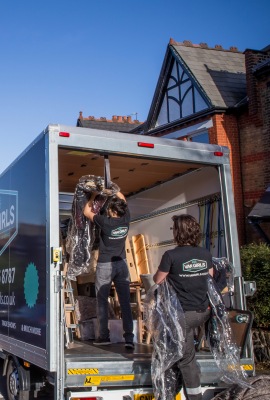
But Emma’s company has cut through all that nonsense. It’s a female-led company so those kind of cultural differences don’t matter. People pick Van Girls either because they think it’s a good idea, they like the novelty and want to support them; or because they have had a bad experience in the past.
“Some of our customers have been made to feel vulnerable or uncomfortable in the past or feel that the movers have been inconsiderate,” she said. “We never suggest that we would be more careful than men, but there does seem to be a perception that girls would handle things more carefully. A lot of women in trades that are male dominated have a constant feeling of being judged, so you have to be the best you can be. If not, people won’t just think it’s because we are not very good, it will be because we are women. We probably carry this thought with us so it makes us more careful.”
But the main market for all-girl crews will, undoubtedly, be in the corporate sector. Assignees’ wives are very often left to get on with the job of moving house while hubby flies out business class to take up his new role, and many woul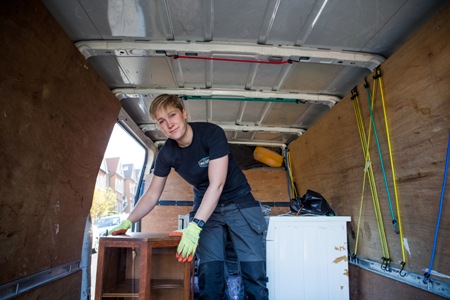 d be much more comfortable if they knew that the crew would be all female. Perhaps it’s an offer that all corporate moving companies should make to their clients: even if the offer was not accepted it would demonstrate a ‘focus on customer needs’ that we hear so much about. When someone does say “yes please” the service is there, ready and waiting.
d be much more comfortable if they knew that the crew would be all female. Perhaps it’s an offer that all corporate moving companies should make to their clients: even if the offer was not accepted it would demonstrate a ‘focus on customer needs’ that we hear so much about. When someone does say “yes please” the service is there, ready and waiting.
It’s still early days for Emma and Justine. They have two vans now and around ten part-time staff they can call upon to meet the day-to-day workload. They have learned to do the work by doing it and by watching demonstrations on YouTube*. Manual Handling training is provided by Emma to all staff and they are trained in how to secure loads. Storage is care of the self storage company with which they share facilities. They are not yet members of a trade association but probably will be soon. Small they may be, maybe even a little naive, but they have enthusiasm in bucket loads and just one click on their website www.vangirls.co.uk clearly demonstrates that they mean business.
Now there is 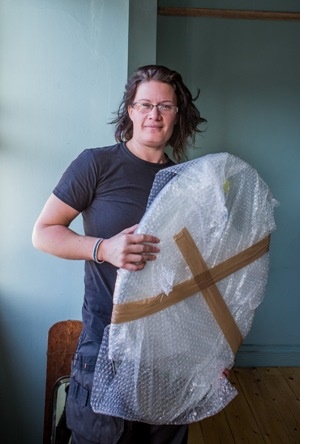 a problem. Anyone who has read this far will be screaming about sex discrimination and complaining that it’s illegal to have a woman-only business. Well, Emma knows that it is essential to operate within the law and has no intention of excluding men from the company. “But we would like to keep the front-line staff ratios such that we can provide all-female crews on request,” said Emma. “That’s the whole point of the company.” And, if men don’t apply there won’t be a problem.
a problem. Anyone who has read this far will be screaming about sex discrimination and complaining that it’s illegal to have a woman-only business. Well, Emma knows that it is essential to operate within the law and has no intention of excluding men from the company. “But we would like to keep the front-line staff ratios such that we can provide all-female crews on request,” said Emma. “That’s the whole point of the company.” And, if men don’t apply there won’t be a problem.
On Emma’s behalf The Mover did contact an employment law specialist, just to clarify the position (see below). We wish them luck and suggest that all movers take a look at the offering they make to their customers, particularly the corporate ones. By excluding the girls, you could be missing a trick.
*Scoff if you like but it’s possible to learn how to do much more complicated things than move furniture by YouTube.
Photos - From the top: Van Girls at work; fourth and fifth picture from top Head Van Girls Emma Lanman and Justine Walsh.
The lawyer’s view
Some might think that by mainly employing women, Emma and team would be in breach of employment legislation. Indeed they might in principle, if they exclude men completely, but it's unlikely to be a practical problem. A company with the name Van Girls is unlikely to attract many male applicants and Emma has said that she doesn’t want to exclude men absolutely. Long term the company just wishes to provide the services its customers request and if some prefer to have female members of the packing crew, that's what they should be able to have.
Click here to view the next Editor's pick